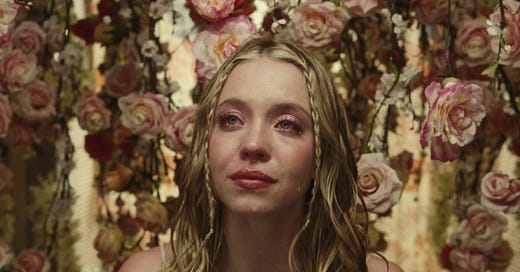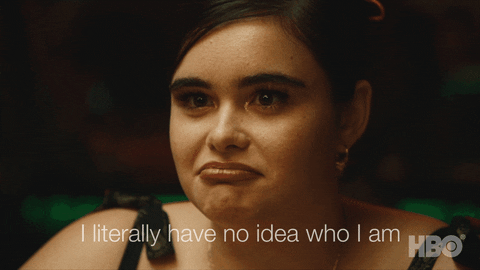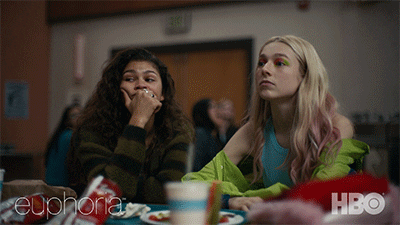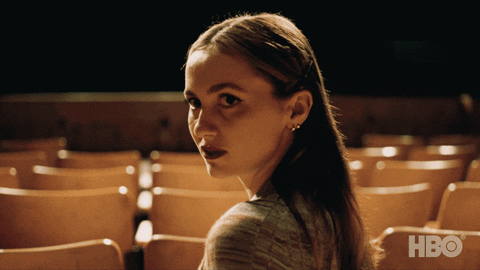I started watching Euphoria recently. The HBO show about high school kids who do a lot of drugs and have a lot of sex, amongst other things. While watching it, and feeling deeply concerned for each character, it brought up a lot of my own experiences as a teenage girl.
(Don’t worry, no Euphoria spoilers here—nor am I concentrating much on the show).
While there have been critiques of this show for things like: “aestheticiz[ing] the traumas it depicts,” “far too much nudity, sex and violence,” and its leaning into the “‘fuckable teen’ trope,” I have grown to appreciate it for one very important aspect.
It’s not every show or movie that does such an incredible job at depicting the specific anxiety and terror of what being a teenage girl feels like. You’re in this body that is changing rapidly and your brain is also doing weird things and you feel utterly helpless and not in control of anything—including yourself. The adults around you are in charge of you, and you desperately want to be in charge of yourself—or feel some sense of autonomy and agency.
While I agree with some of the critiques of the show—hell, even the actresses agree on some of these critiques—I overall think the hyper sexualization of the teens (played by adults, which, yes, problematic), is extremely correct in its portrayal. One of the most unfortunate/problematic/disgusting things about being a teenage girl is the overt sexualization of your being by peers and adults alike. I’m not saying it’s a good thing; I’m saying it’s a real thing.
Jessica Valenti writes in her critique of the show:
But how authentic is it for a breathy teenage girl to lovingly tell the object of her affection, “You can control what I wear, what I eat, who I talk to”? Or for a sexy high school babysitter to get in a hot tub with an equally as beautiful older mom for a little half-naked, wet girl bonding time? I can’t imagine any young girl would see these fairly standard male fantasies as anything recognizable in her own life.
First, I don’t see these as “male fantasies.” In fact, I was a teenage girl who very much remembers falling in (unrequited) love with boys/men, and I daydreamed about them being possessive of me in various ways. Perhaps part of this is early kink-curious behavior (i.e. Dom/sub), even though in kink world there is consent. The other part of this is society and culture.
Second, if you know the character who says the dialogue above (Cassie), it actually makes sense and puts it into context. Cassie is a character desperate for love—for anything that may even resemble love (what she imagines that to be since she hasn’t had any good examples). I think that’s a feeling that teenagers and adults both can relate to and understand.
I think about my own experience as a teenage girl and get anxious all over again for situations I was in or things I did. I hung out with college kids, I partied, I wanted so badly to be liked—especially by boys. Euphoria shows this incredibly well. As a teenage girl, you’re taught that your body is your ultimate currency (i.e. Cassie’s character, but all to an extent). You want boys to like you for you, but you often use the only thing you’re told matters: your body and your sexuality. You’re taught to think so little of boys/men that you believe they only like you because they want to fuck you, and some of them (okay, many of them) prove you right.
I felt so ignored in high school by my peers. I was a nobody. Girls didn’t think of me. Boys didn’t think of me. I felt like an afterthought. I probably was an afterthought. This wasn’t all bad. Since I was rarely seen, I was rarely bullied. I was mostly invisible. I remember feeling like I would have done anything to be noticed. I would have done anything for a boy my age to show interest in me. Thinking back on this, the potential danger is palpable.
I had my first boyfriend at age 14, the summer before starting high school. He was a skater boy with dyed blue hair named Brendan. He only dated me because my friend Kristi wanted nothing to do with him. I was the next best option. It was a short-lived summer “romance” bookended with the music of Pavement’s Slanted & Enchanted album. Listening to “Summer Babe - Winter Version” takes me right back to warm, blue-tinted nights making out on his parent’s front lawn. He was my first kiss. It was the most attention any boy had ever shown me.
When he broke up with me at the end of summer because he was moving to California, I was hurt, but not heartbroken. It would be over a decade later before I would know real, gut-wrenching, dangerous heartbreak. That losing-yourself type of love and loss.
The girls in Euphoria exhibit the tension of wanting visibility/love and then losing themselves when they have it. This is something that doesn’t just affect teen girls, but it’s perhaps most striking at that age. Everything feels like a bigger deal when you’re young, and it is a bigger deal because it’s often the first time you’re experiencing something. It irks me that adults often tell kids they’re “overreacting” about most any social situation. It’s such an invalidation of real, all-consuming emotions that, as teenagers, we often have little control over.
I was bullied by my three best friends when I was sixteen, and looking back, I don’t see any overreaction on my part to the social ostracization and harm I faced. I was sent three hate emails on a Sunday morning informing me what a “bitch” I was and that I was not to sit with them at lunch anymore. Though issues like bullying are handled with slightly more care these days, the other trials and tribulations of teen girl life are still just chalked up to girls being “too sensitive” or “taking things too seriously.” The idea that anytime someone does something to you that feels shitty, you’re suddenly “taking it too seriously” is ridiculous. I learned early on in life that I was “too sensitive,” “too emotional,” and “too much.”
While we can critique Euphoria for its gratuitous nudity, its casting of adult actors to play teenagers, its trauma porn, we can’t and shouldn’t ignore the authenticity in its depiction of the particular horror of being a teenage girl in a society that cares so very little for them.










So well put! I haven't seen the show (and don't know whether I will even have the courage to go there), but your explanation/description/discussion of the anxiety makes it so palpable and clear.
This is a much needed perspective on Euphoria! I agree with a lot of the critiques, but I think this puts into words why the show still has so much value to me. The plot is a teenage experience very different from mine, yet I still feel that emotional authenticity of my own teenage girlhood underlying it all.